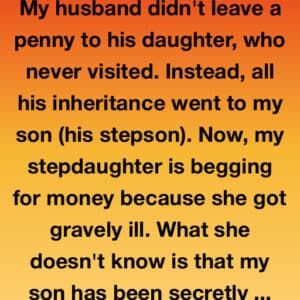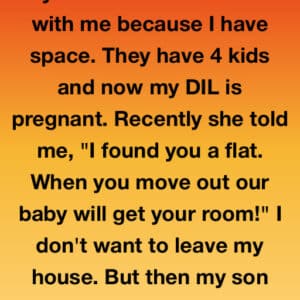After a long stretch of single life, every new outing feels like a gamble between optimism and self‑protection. That flutter of “maybe this is it” is hard to quiet—especially when a man’s first impression seems almost perfect.
That was exactly my reaction when I met Eric.
He was smooth, articulate, and he even arrived with fresh flowers—real stems, not a sad supermarket bundle. He held the door, pushed in my chair, asked about my day, and insisted on covering the bill.
For a moment I wondered if this might be one of those rare, serendipitous tales people in happy marriages swear still happen.
But the note I woke up to the next morning twisted that sweet beginning into something I’ll never forget, though not for any good reason.
It started with my best friend, Mia, who decided to play Cupid. She means well, though her matchmaking résumé is thin. Still, she was persistent. One evening while I rifled through my closet for something to wear, she gushed that Eric was courteous, witty, thoughtful, and handsome, and that I would absolutely adore him.
I reminded her she had never set me up before and asked what made her think he was a fit. She claimed she knew me better than anyone and, more importantly, her longtime boyfriend Chris vouched for Eric’s character. That endorsement made me pause. Chris is usually a rock‑solid judge of people, so maybe it wasn’t a total leap of faith.
I sighed and asked to see a photo. Moments later my phone pinged. On the screen was a clean‑cut man dressed sharply, sporting kind eyes. He was cute, I admitted. Mia urged me to text him, saying I wouldn’t regret it.
After a courteous exchange of messages, Eric and I set dinner plans at a cozy Italian spot by the river. The place was intimate without being flashy, just romantic enough to show he was serious. I arrived a few minutes early and was checking my lipstick in my phone when I saw him approach—tall, neatly dressed, carrying a lavish bouquet bound with ribbon.
He greeted me warmly and handed over the roses, a gesture so old‑fashioned it colored my cheeks. While I thanked him, he reached into his coat for a tiny box. Inside was a silver keychain engraved with the letter K, elegantly chosen. He said Mia had given him a hint about my taste and that it was merely a small token.
I was charmed. Who brings roses and a personalized gift on a first date?
Throughout dinner he kept up the gentleman routine, opening doors, asking genuine questions, listening closely. He made me laugh describing his marketing job and the eccentric coworkers on his team. We bonded over crime podcasts and eccentric documentaries, the sort of topics that melt tension.
When the check landed, habit made me reach for my purse. Eric waved me off with a firm statement that a man pays on a first date, delivered as though quoting sacred scripture. I chuckled and let him have his way. Outside, he walked me to my car, offered a friendly hug, then asked if he might call soon. I told him I would like that and drove home believing maybe a good thing had begun.
The next morning I woke to a notification from Eric. Half awake, I assumed it would be a sweet “had a great time” message. Instead, there was a PDF attachment. Curious, I opened it—and almost spilled my coffee.
The document’s title read “Date Night Invoice — Outstanding Balance.” Beneath that heading was an itemized list of the courtesies he had provided, each matched with what he called a required payment, none of it monetary. The roses, he claimed, entitled him to a hug. The custom keychain demanded a coffee outing within the week. Opening the car door meant I owed him a selfie together. Pulling out my chair should lead to holding hands next date. His listening and compliments needed to be repaid with admiration of his looks. Covering dinner itself required a second date guaranteed, no excuses. And at the bottom, in bold letters, he declared payment was due in full, no refunds, and failure might send the balance to collections with Chris notified.
My jaw truly dropped.
I snapped a screenshot and shot it to Mia. Her reply landed in seconds, all caps, insisting she was showing it to Chris immediately. Five minutes later my phone rang. Chris was laughing so hard he could barely speak. He said he had known Eric for years and never imagined this. He insisted we needed to answer in kind.
Chris drafted a matching document, dripping with mock formality. Under the new heading “Service Invoice — Amount Due: Lifetime of Silence,” he listed repayment terms that included permanent blocking, mandatory therapy, and apologies to every woman Eric had misled. He closed by threatening public embarrassment. Chris sent it off with glee.
Almost instantly Eric’s indignant texts appeared: accusations of immaturity, claims that he was merely setting clear expectations, warnings that I had missed out on a great guy. I answered with a single thumbs‑up emoji and blocked him.
Later that night Mia called between fits of giggles to apologize for her disastrous match. I told her not to worry—at least we’d earned a fantastic story.
Dating after sixty isn’t always candlelit walks and violin music. Sometimes it veers into absurdity. Yet each episode teaches a lesson. I learned to watch for red flags even when they arrive wrapped in roses. I discovered that if a man insists on paying, he might secretly be writing up an invoice. Most of all, I was reminded that a good laugh, supportive friends, and a perfectly sharp comeback can salvage even the weirdest experience.
I kept the keychain, not as a token of Eric, but as a souvenir from the strangest, funniest first‑and‑last date I’ve ever had.





